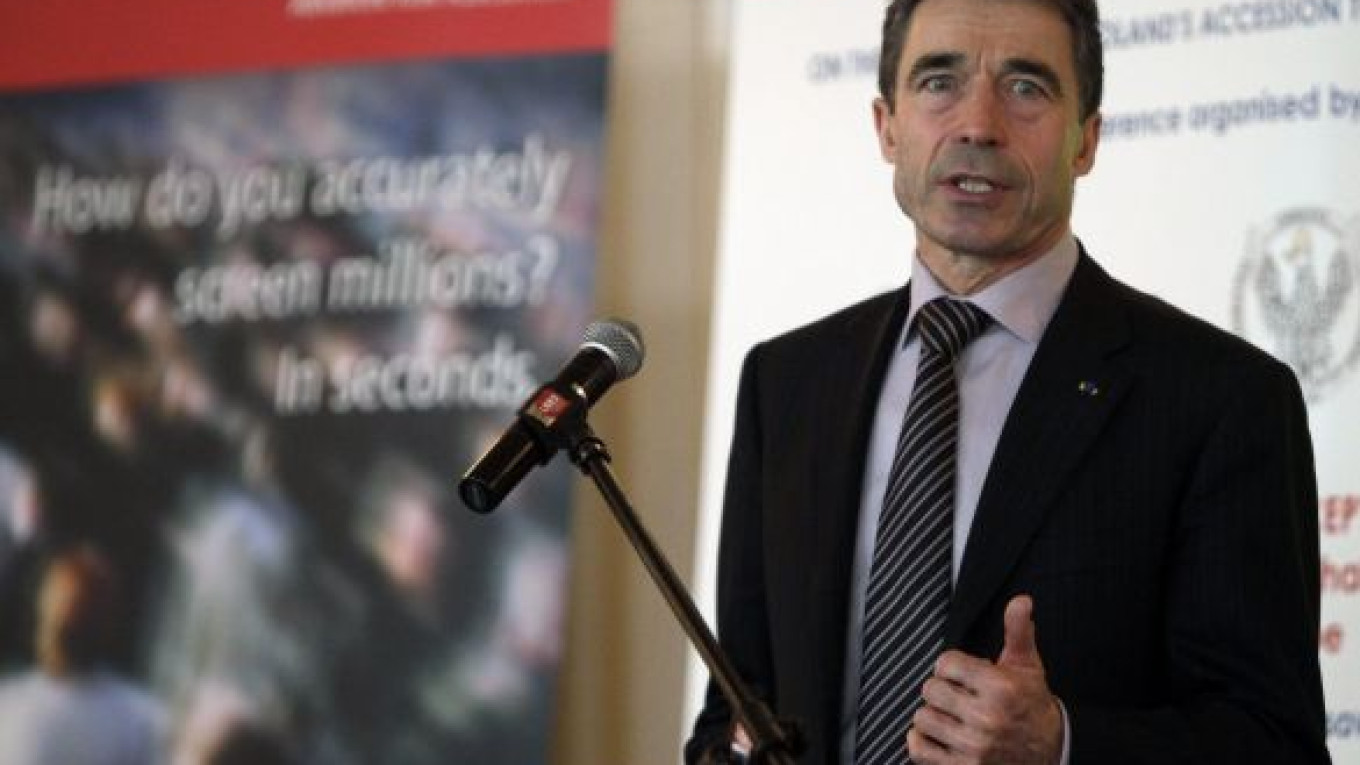NATO Secretary-General Anders Fogh Rasmussen said Russia's new military doctrine is outdated and "does not reflect the real world."
The doctrine, approved last month, identifies NATO's expansion east to Russia's borders as a "main external danger" and also sees U.S. plans to create an anti-missile shield in Europe as a national security concern.
But Rasmussen said NATO is not a threat to Russia and will "never invade Russia."
Russia's military doctrine represents "a very outdated notion of the nature and role of NATO, but we can't let this hold the whole relationship with Russia to ransom," Rasmussen said at a conference in Warsaw devoted to NATO's plans for a new strategic blueprint.
The NATO chief also sought to assuage East Europeans' concerns that NATO does not fully safeguard their security in the face of a more assertive Russia.
"The best reassurance of all [for Eastern Europe] would be to engage Russia in a true strategic partnership," Rasmussen said on the sidelines of the conference.
"We know we have our disagreements," he said, "but there are also a number of areas in which Russia and NATO countries are faced with the same threats — Afghanistan, terrorism, the proliferation of weapons of mass destruction, and I think we should develop methods of practical cooperation."
Polish Foreign Minister Radoslaw Sikorski told the conference that former Communist countries want the new strategic concept to provide the same security guarantees as those taken for granted by older members of NATO.
"Central and Eastern Europe wants strategic reassurance," said Sikorski, adding that Poland backs the efforts of Rasmussen and U.S. President Barack Obama to re-engage with Russia.
Washington vowed last year to press the "reset button" with Moscow.
"The message from Warsaw is twofold — re-engagement with Russia and reassurance for us," Sikorski said.
Sikorski reiterated Poland's long-standing desire to host NATO installations on its territory, noting that Warsaw has proven its reliability as an ally after dispatching one of the biggest contingents to the alliance's mission in Afghanistan.
Rasmussen reaffirmed NATO's "open-door" policy that envisages former Soviet republics such as Ukraine and Georgia eventually joining the alliance if they wish to and provided that they fulfill the membership conditions. Moscow fiercely opposes this policy.
Rasmussen said Russia itself could theoretically qualify for NATO membership but added that he did not see this as "realistic."
Commenting on NATO's new strategic blueprint, which is due to be approved later this year, Rasmussen reassured the Poles that it would restate the main task of the alliance as defending all the territory and the populations of member states.
"But the new concept will also reflect the fact that the meaning of territorial defense is changing. Static heavy forces won't deter terrorists, computer hackers or rogue states," he told the conference.
(Reuters, AP, MT)
A Message from The Moscow Times:
Dear readers,
We are facing unprecedented challenges. Russia's Prosecutor General's Office has designated The Moscow Times as an "undesirable" organization, criminalizing our work and putting our staff at risk of prosecution. This follows our earlier unjust labeling as a "foreign agent."
These actions are direct attempts to silence independent journalism in Russia. The authorities claim our work "discredits the decisions of the Russian leadership." We see things differently: we strive to provide accurate, unbiased reporting on Russia.
We, the journalists of The Moscow Times, refuse to be silenced. But to continue our work, we need your help.
Your support, no matter how small, makes a world of difference. If you can, please support us monthly starting from just $2. It's quick to set up, and every contribution makes a significant impact.
By supporting The Moscow Times, you're defending open, independent journalism in the face of repression. Thank you for standing with us.
Remind me later.


